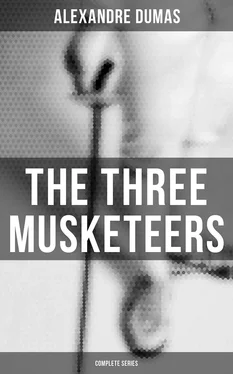In the meanwhile the promises of M. de Treville went on prosperously. One fine morning the king commanded M. de Chevalier Dessessart to admit d’Artagnan as a cadet in his company of Guards. D’Artagnan, with a sigh, donned his uniform, which he would have exchanged for that of a Musketeer at the expense of ten years of his existence. But M. de Treville promised this favor after a novitiate of two years—a novitiate which might besides be abridged if an opportunity should present itself for d’Artagnan to render the king any signal service, or to distinguish himself by some brilliant action. Upon this promise d’Artagnan withdrew, and the next day he began service.
Then it became the turn of Athos, Porthos, and Aramis to mount guard with d’Artagnan when he was on duty. The company of M. le Chevalier Dessessart thus received four instead of one when it admitted d’Artagnan.
Chapter 8
Concerning a Court Intrigue
Table of Contents
In the meantime, the forty pistoles of King Louis XIII, like all other things of this world, after having had a beginning had an end, and after this end our four companions began to be somewhat embarrassed. At first, Athos supported the association for a time with his own means.
Porthos succeeded him; and thanks to one of those disappearances to which he was accustomed, he was able to provide for the wants of all for a fortnight. At last it became Aramis’s turn, who performed it with a good grace and who succeeded—as he said, by selling some theological books—in procuring a few pistoles.
Then, as they had been accustomed to do, they had recourse to M. de Treville, who made some advances on their pay; but these advances could not go far with three Musketeers who were already much in arrears and a Guardsman who as yet had no pay at all.
At length when they found they were likely to be really in want, they got together, as a last effort, eight or ten pistoles, with which Porthos went to the gaming table. Unfortunately he was in a bad vein; he lost all, together with twenty-five pistoles for which he had given his word.
Then the inconvenience became distress. The hungry friends, followed by their lackeys, were seen haunting the quays and Guard rooms, picking up among their friends abroad all the dinners they could meet with; for according to the advice of Aramis, it was prudent to sow repasts right and left in prosperity, in order to reap a few in time of need.
Athos was invited four times, and each time took his friends and their lackeys with him. Porthos had six occasions, and contrived in the same manner that his friends should partake of them; Aramis had eight of them. He was a man, as must have been already perceived, who made but little noise, and yet was much sought after.
As to d’Artagnan, who as yet knew nobody in the capital, he only found one chocolate breakfast at the house of a priest of his own province, and one dinner at the house of a cornet of the Guards. He took his army to the priest’s, where they devoured as much provision as would have lasted him for two months, and to the cornet’s, who performed wonders; but as Planchet said, “People do not eat at once for all time, even when they eat a good deal.”
D’Artagnan thus felt himself humiliated in having only procured one meal and a half for his companions—as the breakfast at the priest’s could only be counted as half a repast—in return for the feasts which Athos, Porthos, and Aramis had procured him. He fancied himself a burden to the society, forgetting in his perfectly juvenile good faith that he had fed this society for a month; and he set his mind actively to work. He reflected that this coalition of four young, brave, enterprising, and active men ought to have some other object than swaggering walks, fencing lessons, and practical jokes, more or less witty.
In fact, four men such as they were—four men devoted to one another, from their purses to their lives; four men always supporting one another, never yielding, executing singly or together the resolutions formed in common; four arms threatening the four cardinal points, or turning toward a single point—must inevitably, either subterraneously, in open day, by mining, in the trench, by cunning, or by force, open themselves a way toward the object they wished to attain, however well it might be defended, or however distant it may seem. The only thing that astonished d’Artagnan was that his friends had never thought of this.
He was thinking by himself, and even seriously racking his brain to find a direction for this single force four times multiplied, with which he did not doubt, as with the lever for which Archimedes sought, they should succeed in moving the world, when someone tapped gently at his door. D’Artagnan awakened Planchet and ordered him to open it.
From this phrase, “d’Artagnan awakened Planchet,” the reader must not suppose it was night, or that day was hardly come. No, it had just struck four. Planchet, two hours before, had asked his master for some dinner, and he had answered him with the proverb, “He who sleeps, dines.” And Planchet dined by sleeping.
A man was introduced of simple mien, who had the appearance of a tradesman. Planchet, by way of dessert, would have liked to hear the conversation; but the citizen declared to d’Artagnan that what he had to say being important and confidential, he desired to be left alone with him.
D’Artagnan dismissed Planchet, and requested his visitor to be seated. There was a moment of silence, during which the two men looked at each other, as if to make a preliminary acquaintance, after which d’Artagnan bowed, as a sign that he listened.
“I have heard Monsieur d’Artagnan spoken of as a very brave young man,” said the citizen; “and this reputation which he justly enjoys had decided me to confide a secret to him.”
“Speak, monsieur, speak,” said d’Artagnan, who instinctively scented something advantageous.
The citizen made a fresh pause and continued, “I have a wife who is seamstress to the queen, monsieur, and who is not deficient in either virtue or beauty. I was induced to marry her about three years ago, although she had but very little dowry, because Monsieur Laporte, the queen’s cloak bearer, is her godfather, and befriends her.”
“Well, monsieur?” asked d’Artagnan.
“Well!” resumed the citizen, “well, monsieur, my wife was abducted yesterday morning, as she was coming out of her workroom.”
“And by whom was your wife abducted?”
“I know nothing surely, monsieur, but I suspect someone.”
“And who is the person whom you suspect?”
“A man who has pursued her a long time.”
“The devil!”
“But allow me to tell you, monsieur,” continued the citizen, “that I am convinced that there is less love than politics in all this.”
“Less love than politics,” replied d’Artagnan, with a reflective air; “and what do you suspect?”
“I do not know whether I ought to tell you what I suspect.”
“Monsieur, I beg you to observe that I ask you absolutely nothing. It is you who have come to me. It is you who have told me that you had a secret to confide in me. Act, then, as you think proper; there is still time to withdraw.”
“No, monsieur, no; you appear to be an honest young man, and I will have confidence in you. I believe, then, that it is not on account of any intrigues of her own that my wife has been arrested, but because of those of a lady much greater than herself.”
“Ah, ah! Can it be on account of the amours of Madame de Bois-Tracy?” said d’Artagnan, wishing to have the air, in the eyes of the citizen, of being posted as to court affairs.
“Higher, monsieur, higher.”
“Of Madame d’Aiguillon?”
“Still higher.”
Читать дальше












